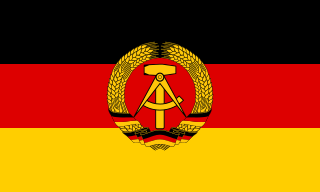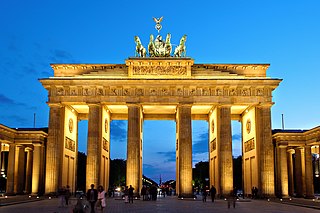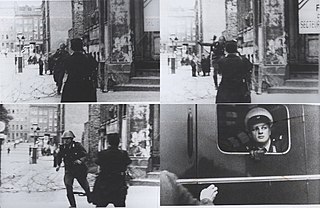
The Berlin Wall was a guarded concrete barrier that physically and ideologically divided Berlin from 1961 to 1989. Construction of the wall was commenced by the German Democratic Republic on 13 August 1961. The Wall cut off West Berlin from surrounding East Germany, including East Berlin. The barrier included guard towers placed along large concrete walls, accompanied by a wide area that contained anti-vehicle trenches, beds of nails and other defenses. The Eastern Bloc portrayed the Wall as protecting its population from fascist elements conspiring to prevent the "will of the people" from building a socialist state in East Germany.

East Germany, officially the German Democratic Republic, was a state that existed from 1949 to 1990, the period when the eastern portion of Germany was part of the Eastern Bloc during the Cold War. Commonly described as a communist state in English usage, it described itself as a socialist "workers' and peasants' state". It consisted of territory that was administered and occupied by Soviet forces following the end of World War II—the Soviet occupation zone of the Potsdam Agreement, bounded on the east by the Oder–Neisse line. The Soviet zone surrounded West Berlin but did not include it and West Berlin remained outside the jurisdiction of the GDR.

Walter Ernst Paul Ulbricht was a German communist politician. Ulbricht played a leading role in the creation of the Weimar-era Communist Party of Germany (KPD) and later in the early development and establishment of the German Democratic Republic in East Germany. As the First Secretary of the Socialist Unity Party from 1950 to 1971, he was the chief decision-maker in East Germany. From President Wilhelm Pieck's death in 1960 on, he was also the East German head of state until his own death in 1973. As the firm leader of the strongest and most important Communist satellite, Ulbricht had a degree of bargaining power with the Kremlin that he used effectively. For example he demanded the building of the Berlin Wall in 1961 when the Kremlin was reluctant.

German reunification was the process in 1990 in which the German Democratic Republic (GDR) became part of the Federal Republic of Germany (FRG) to form the reunited nation of Germany.

The Brandenburg Gate is an 18th-century neoclassical monument in Berlin, built on the orders of Prussian king Frederick William II after the temporary restoration of order during the Batavian Revolution. One of the best-known landmarks of Germany, it was built on the site of a former city gate that marked the start of the road from Berlin to the town of Brandenburg an der Havel, which used to be capital of the Margraviate of Brandenburg.

Checkpoint Charlie was the best-known Berlin Wall crossing point between East Berlin and West Berlin during the Cold War (1947–1991), as named by the Western Allies.

Egon Rudi Ernst Krenz is a former East German politician who was the last communist leader of East Germany during the final months of 1989. He succeeded Erich Honecker as the General Secretary of the ruling Socialist Unity Party of Germany (SED), but was forced to resign only weeks later when the Berlin Wall fell.

Günter Schabowski was an East German politician who served as an official of the Socialist Unity Party of Germany, the ruling party during most of the existence of the German Democratic Republic (GDR). Schabowski gained worldwide fame in November 1989 when he improvised a slightly-mistaken answer to a press conference question. That raised popular expectations much more rapidly than the government planned and so massive crowds gathered the same night at the Berlin Wall, which forced its opening after 28 years. Soon afterward, the entire inner German border was opened.
Friedrich August von Finck was a Prussian general and writer.

"Mr. Gorbachev, tear down this wall", also known as the Berlin Wall Speech, was a speech delivered by United States President Ronald Reagan in West Berlin on June 12, 1987. Reagan called for the General Secretary of the Communist Party of the Soviet Union, Mikhail Gorbachev, to open the Berlin Wall, which had separated West and East Berlin since 1961. The name is derived from a key line in the middle of the speech: "Mr. Gorbachev, tear down this wall!"

Hans Konrad Schumann was an East German border guard who escaped to West Germany during the construction of the Berlin Wall in 1961.

The Berliner Zeitung is a daily newspaper based in Berlin, Germany. It was founded in East Germany in 1945 and continued publication after reunification.

Finck von Finckenstein is a noble family classified as Uradel. It is one of the oldest Prussian aristocratic families extant, dating back to the 12th century in the Duchy of Carinthia.
Serge Schmemann is a writer and was editorial page editor of the International Herald Tribune, the global edition of the New York Times which ceased publication under that name in 2013. Earlier in his career, he worked for the Associated Press and was a bureau chief and editor for The New York Times.
Eva Gräfin Finck von Finckenstein was a German politician, representative of the German Christian Democratic Union.

Riccardo Ehrmann is a retired Italian journalist whose question at a government press conference in the former East Germany is said to have precipitated the end of the Berlin Wall.

The inner German border rapidly and unexpectedly fell in November 1989, along with the fall of the Berlin Wall. The event paved the way for the ultimate reunification of Germany just short of a year later.

Not Without Gisela is a 1951 West German musical comedy film directed by Hans Deppe and starring Peter Mosbacher, Eva Ingeborg Scholz and Hilde Sessak.

The fall of the Berlin Wall on 9 November 1989 was a pivotal event in world history which marked the falling of the Iron Curtain and the start of the fall of communism in Eastern and Central Europe. The fall of the inner German border took place shortly afterwards. An end to the Cold War was declared at the Malta Summit three weeks later and the German reunification took place in October the following year.















